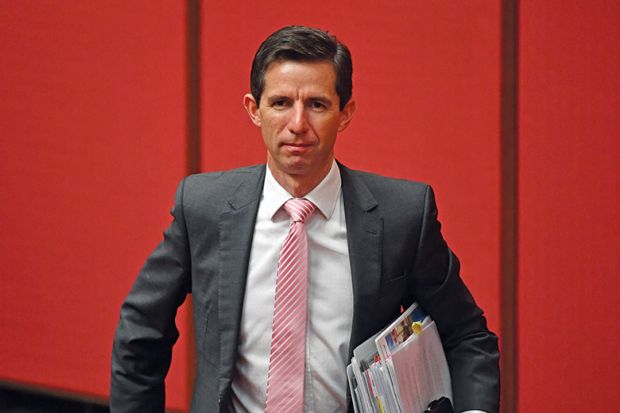Australia’s former education minister secretly vetoed 11 humanities research projects, overturning recommendations made by the Australian Research Council, it has emerged.
Simon Birmingham, who is now a trade minister, blocked the allocation of A$4.2 million (£2.3 million) in grants in his last year in office, in an extraordinary departure from protocol.
The intervention, revealed in a sitting of a Senate estimates committee on 25 October, is likely to inflame concerns about the independence of Australia’s research community and the government’s perceived hostility towards the humanities.
It will also undermine government demands for universities to uphold freedom of expression, following recent campus protests that disrupted addresses by several conservative speakers, and the Australian National University’s rejection of philanthropic funding to underwrite a degree in Western civilisation.
Among the projects overturned by Mr Birmingham were “a history of men’s dress 1870-1970”, “beauty and ugliness as persuasive tools in changing China’s gender norms”, and “music, heritage and cultural justice in the post-industrial legacy city”.
Other vetoed projects included “Soviet cinema in Hollywood before the blacklist, 1917-1950”, “the music of nature and the nature of music”, and “righting the struggle for Sioux modernity”.
The research projects involved academics from nine universities – five of them members of the prestigious Group of Eight research-intensive institutions – and had been earmarked funds of between A$162,000 and A$926,000 each.
Kim Carr, the shadow science minister, described the “disgraceful” political intervention as “political correctness gone mad”.
“This is just pandering to the knuckle-draggers and philistines found in the right wing of this government,” he said. “This goes to their profound hatred of arts, history, culture and music and demonstrates their ignorance and contempt for scholarship in Australia.”
Under normal research funding processes, the hundreds of grant applications endorsed each year by the ARC are automatically approved by the minister of the day.
The last minister who ignored ARC recommendations – Liberal education minister Brendan Nelson in 2004 and 2005 – attracted headlines around the country and was accused of censorship by then ANU vice-chancellor Ian Chubb.
Five of the recently blocked projects were to have been funded under early career researcher and future fellowship schemes that have never previously been subjected to ministerial veto.
The committee heard that the proponents of the 11 projects had not been informed that their applications had initially been approved. Mr Birmingham also overlooked a protocol, instituted by Mr Carr when he was education minister, that requires ministerial rejections of grants to be publicly declared.
Mr Carr said that it was an “unprecedented act of censorship and a rejection of early career researchers and future fellows”.
“This minister has acted with no explanation and sought to suppress the details. This makes a mockery of our international reputation for scholarship.”
Representative body Universities Australia said funding of research must be free of political intervention.
"You don't expect the federal sports minister to choose Australia's Olympic team. In the same way, we rely on subject experts to judge the best research in their field, not politicians,” said chief executive Catriona Jackson.
Go8 chief executive Vicki Thomson said Mr Birmingham’s actions had been “reprehensible”.
“This is a government that demands freedom of speech on campus but at the same time walks all over academic freedom.”
Mr Birmingham and his successor as education minister, Dan Tehan, have been approached for comment.




